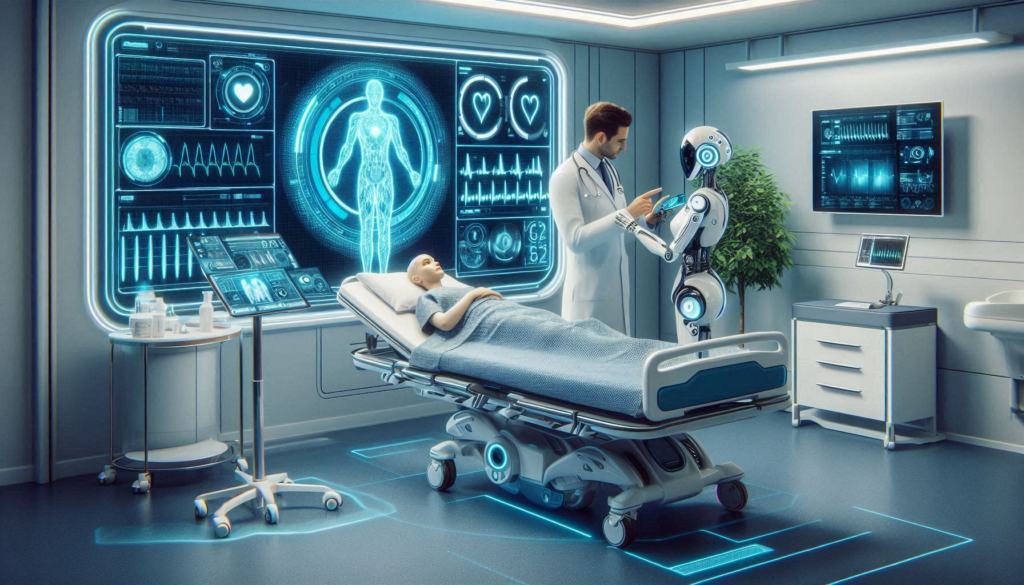Artificial Intelligence in healthcare

In an era of rapid technological advancements, Artificial Intelligence (AI) has emerged as a game-changer in the healthcare industry. From diagnostics to personalized treatment plans, AI is revolutionizing patient care and reshaping medical practices. In this comprehensive guide, we delve into the multifaceted applications of AI in healthcare, exploring its benefits, challenges, and future prospects.
AI in healthcare Diagnostics and Imaging
Artificial Intelligence in healthcare is revolutionizing diagnostics and imaging in healthcare, offering unprecedented accuracy, efficiency, and early detection capabilities. AI algorithms, particularly those utilizing deep learning and neural networks, are capable of analyzing vast amounts of medical data and images far more quickly and precisely than traditional methods. This technology enhances diagnostic processes, aids in identifying diseases at their earliest stages, and reduces the workload on healthcare professionals. Some notable examples of AI in diagnostics and imaging include:

- Early Detection of Cancer: AI systems like Google’s DeepMind have developed algorithms that can detect breast cancer in mammograms with higher accuracy than radiologists.
- Example: These AI algorithms can reduce false positives and negatives, leading to more reliable breast cancer screening and early intervention.
- Diabetic Retinopathy Screening: AI tools such as IDx-DR are FDA-approved for detecting diabetic retinopathy from retinal images, providing accurate results without the need for a specialist.
- Example: This means that patients can get a timely diagnosis and treatment plan from primary care providers, enhancing access to care for diabetic eye disease.
- Cardiovascular Imaging: AI applications in cardiology, such as Arterys, utilize machine learning to analyze cardiac MRI scans, helping in the diagnosis of heart diseases with greater precision.
- Example: These AI tools can identify heart conditions more accurately and quickly than traditional methods, leading to better treatment outcomes for patients with cardiovascular issues.
- Lung Disease Detection: AI-powered platforms like Zebra Medical Vision can identify early signs of conditions like tuberculosis, pneumonia, and lung cancer in chest X-rays.
- Example: By detecting these conditions early, AI enables timely intervention, which can be crucial for patient recovery and reducing the spread of infectious diseases.
- Pathology: AI systems such as PathAI assist pathologists by analyzing tissue samples for cancerous cells, improving diagnostic accuracy, and speeding up the process.
- Example: This technology allows for faster and more precise identification of cancer, helping pathologists to deliver more accurate diagnoses and enabling quicker treatment decisions.
Ai and Healthcare Personalized Treatment Plans
AI is playing a pivotal role in the development and implementation of personalized treatment plans, transforming healthcare by making it more tailored and effective. By analyzing vast amounts of patient data, AI algorithms can identify patterns and insights that would be impossible for humans to discern. This allows for more accurate diagnoses and customized treatment strategies. Here are a few examples of how AI is enhancing personalized treatment plans:

- Predictive Analytics in Oncology: AI tools like IBM Watson for Oncology analyze a patient’s genetic information, medical history, and the latest research to recommend personalized cancer treatments.
- Example: It can suggest specific chemotherapy drugs that target the unique genetic mutations found in an individual’s tumor, providing a more effective and less toxic treatment option.
- Customized Drug Prescriptions: AI-driven pharmacogenomics platforms can predict how a patient will respond to different medications based on their genetic profile.
- Example: AI can help determine the right antidepressant for a patient, reducing the time and side effects associated with the trial-and-error method, leading to quicker and more effective mental health management.
- Diabetes Management: AI applications such as the IBM Watson Health platform analyze data from continuous glucose monitors, insulin pumps, and lifestyle factors to create personalized insulin dosing recommendations and lifestyle adjustments for people with diabetes.
- Example: A diabetic patient can receive real-time advice on insulin administration and dietary changes, improving blood sugar control and overall health.
- Cardiology: AI can assess a patient’s risk of heart disease by analyzing data from wearable devices, medical records, and genetic tests. It can then recommend personalized preventive measures.
- Example: An AI system might suggest a tailored exercise program for a patient based on their unique cardiovascular profile, helping to reduce the risk of heart disease.
- Mental Health: AI-powered chatbots and virtual therapists can provide personalized mental health support by adapting their responses and recommendations based on the user’s mood, history, and interaction patterns.
- Example: An AI chatbot might recommend mindfulness exercises or cognitive behavioral techniques specific to the user’s needs, offering a tailored approach to mental wellness and improving overall mental health outcomes.
Challenges and Ethical Considerations
AI is incredibly powerful in addressing the challenges and ethical considerations in healthcare, but it also brings its own set of complexities that need careful handling. By navigating these issues thoughtfully, AI can ensure that its implementation is both effective and ethical. Here are some examples of how AI is addressing these challenges:

- Bias and Fairness: AI systems can unintentionally inherit biases from the data they are trained on, which can lead to unfair treatment recommendations. To combat this, organizations like Google Health are developing algorithms that actively identify and mitigate biases, ensuring more equitable healthcare outcomes.
- Example: AI systems are being trained on diverse datasets to better understand and treat underrepresented populations, reducing disparities in medical treatment.
- Privacy and Security: Protecting patient data is paramount. AI technologies are being designed with robust encryption and anonymization techniques to safeguard sensitive information.
- Example: The use of federated learning, where AI models are trained across multiple decentralized devices or servers holding local data samples, enhances data privacy by keeping patient data secure and localized.
- Transparency and Explainability: One of the key challenges is making AI decisions understandable to both clinicians and patients. Efforts are being made to develop explainable AI (XAI) systems that provide clear and understandable insights into how decisions are made.
- Example: IBM’s AI Explainability 360 toolkit helps developers create more transparent AI models, ensuring that healthcare providers can explain AI-driven decisions to their patients.
- Regulatory Compliance: AI in healthcare must adhere to strict regulations to ensure patient safety and efficacy. Regulatory bodies like the FDA are working on frameworks to evaluate and approve AI-based medical devices and applications.
- Example: The FDA has approved AI algorithms for medical imaging that have undergone rigorous testing and validation to meet high standards of safety and performance.
- Ethical Decision-Making: AI systems must be programmed to make ethical decisions, especially in critical care scenarios. Researchers are incorporating ethical frameworks into AI systems to guide decisions that align with medical ethics and patient rights.
- Example: AI in palliative care can help determine the best course of action by considering patient comfort and quality of life, not just clinical outcomes.
Artificial intelligence Ai in healthcare Future Prospects
AI is poised to play a significant role in shaping the future of healthcare, with numerous exciting prospects on the horizon. As AI technologies continue to advance, they promise to bring even greater innovations and improvements to patient care. Here are a few examples of how AI is set to transform the future of healthcare:

- Predictive Health Monitoring: AI systems are being developed to continuously monitor patients’ health data from wearable devices, predicting potential health issues before they become critical.
- Example: AI algorithms could alert healthcare providers to early signs of heart disease or diabetes, allowing for preventive measures that could significantly improve patient outcomes.
- Personalized Medicine: The future of AI in personalized medicine involves using AI to analyze genetic, environmental, and lifestyle data to create highly individualized treatment plans.
- Example: AI could develop a personalized cancer treatment protocol that considers the patient’s unique genetic profile and response to previous treatments, enhancing the effectiveness and reducing side effects.
- Virtual Health Assistants: AI-powered virtual assistants are expected to become more sophisticated, providing patients with personalized health advice and support 24/7.
- Example: An AI virtual assistant could help manage chronic conditions by reminding patients to take their medication, suggesting lifestyle changes, and answering health-related questions, thus improving adherence and outcomes.
- Robotic Surgery: AI is advancing robotic surgery, making procedures more precise and less invasive.
- Example: AI-driven surgical robots can assist surgeons in complex operations, improving accuracy and reducing recovery times, which leads to better patient outcomes and shorter hospital stays.
- Drug Discovery: AI is accelerating the drug discovery process by predicting how different compounds will interact with the human body.
- Example: AI can analyze vast datasets to identify potential drug candidates, speeding up the development of new medications for diseases such as Alzheimer’s and cancer
Thank You
- DNA sequencing Overview, Process, and Sequences
- Whole exome sequencing Results, Diseases Detection, and clinical exome sequencing
- Whole exome sequencing Cost, Importance, and time
- What is Whole Exome Sequencing in 2025 in 2 minutes
- 10 Case Studies of Successful Implementation of AI in Healthcare By SciMedian.



![Top 5 Examples of AI in Healthcare- By SciMedian [Part 1]](https://scimedian.in/wp-content/uploads/2024/07/Artificial-intelligence-1-1024x576.jpg)
